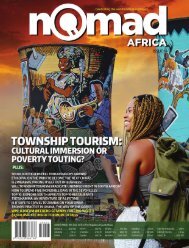Nomad_Africa_Edition12
Born from a passionate desire to dispel the negative perceptions which the world has held of the African Continent, and to replace it with a positive focus, Nomad Africa magazine celebrates life on the African continent. Covering stories from all countries and all cultures, it strives to include unique tourist attractions, business development, technology and investment opportunities as well as looking at the continent's cultural heritage. Nomad Africa inspires and breeds a conscious, knowledgeable generation of visionaries among our own, and influences positive perceptions and appreciation for the true worth of Africa worldwide.
Born from a passionate desire to dispel the negative perceptions which the world has held of the African Continent, and to replace it with a positive focus, Nomad Africa magazine celebrates life on the African continent. Covering stories from all countries and all cultures, it strives to include unique tourist attractions, business development, technology and investment opportunities as well as looking at the continent's cultural heritage. Nomad Africa inspires and breeds a conscious, knowledgeable generation of visionaries among our own, and influences positive perceptions and appreciation for the true worth of Africa worldwide.
You also want an ePaper? Increase the reach of your titles
YUMPU automatically turns print PDFs into web optimized ePapers that Google loves.
Tourism Updates<br />
destinations are still there and they are left<br />
to deal with the consequences and how<br />
they affect their lifestyles.”<br />
According to Professor Lipman, tourism is “a<br />
growing and substantive part of all<br />
economies of all countries in the world.<br />
Every country has the capacity to be an exporter<br />
of their own product.”<br />
“We know it’s a particularly good thing for<br />
small island states and countries, and we<br />
can make tourism a discipline in schools because<br />
up until now, tourism is regarded as<br />
a sub section of geography. Even at universities,<br />
there is a limited amount of education<br />
around travel”.<br />
“Tourism has not been put together in a<br />
comprehensive fashion and therefore we<br />
think that there is huge scope around the<br />
world for bringing the concept of Impact<br />
Travel into our education systems.”<br />
Professor Lipman concluded that if the<br />
tourism industry is to meet the demands of<br />
the modern world, it has to “prove its sustainability<br />
and the challenge of carbon<br />
emissions has to be put on top of the priority<br />
list.”<br />
Very insightful words by one of the world’s<br />
leading experts and a former top executive<br />
of IATA (International Air Transport Association),<br />
WTTC (World Travel & Tourism Council),<br />
WTO (World Trade Organization) and<br />
current president of ICTP (international<br />
Council of Tourism Partners) and the Green<br />
Growth Travelism Institute.<br />
<strong>Nomad</strong> <strong>Africa</strong> Magazine spoke to the Mauritian<br />
Minister of Tourism, Mr Anil Gayan SC,<br />
who explained the implications of digitalisation<br />
and the collecting data in terms of it<br />
affecting the tourism sector.<br />
“I personally have learnt a lot, I am sure that<br />
all those who attended this conference will<br />
look at digitalisation in a different way, not<br />
only at what it can do to improve the industry<br />
and our daily life, but also the dangers<br />
that digitalisation can bring.”<br />
“There are a few trends worldwide towards<br />
digitalisation on a massive scale such as the<br />
impact of China on the tourism market,<br />
where millions of bookings for tourism are<br />
made on a mobile telephone, the enormous<br />
collection of personal data, as well as<br />
the implementation of The EU General Data<br />
Protection Regulation on 25 May 2018.”<br />
Mr Gayan also emphasised the very important<br />
need for privacy data protection regulations<br />
and how this will affect tourists. The<br />
dissemination of such data is a sensitive<br />
issue, which stakeholders will need to navigate<br />
through within the context of digitalisation<br />
and how they conduct their business.<br />
“All these are issues that prompted us to<br />
have this conference so that all stakeholders<br />
in the industry will be aware of what is involved<br />
and to prevent any mishaps in the<br />
handling of personal data. We think that our<br />
operators need to know all the implications<br />
of what is happening in the world.”<br />
“I want to make it very clear that we are very<br />
concerned that there should be no attempt<br />
of any kind on the privacy of an individual.<br />
We need to protect the privacy of the individual,<br />
but of course, as modern life goes<br />
on, there will be a lot of personal data that<br />
will be collected. We cannot get out of the<br />
system but whether, - we get out of the system<br />
or not, and since we have no choice<br />
but to be in the system, we need to have an<br />
environment, where we can protect personal<br />
data. If data is going to used, we have<br />
to make sure it is going to be used with the<br />
consent of the person and that the person<br />
Issue 12 | ...Celebrating the world’s richest continent | www.nomadafricamag.com | 83





